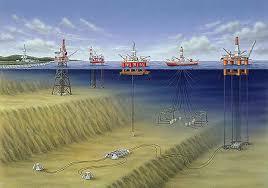
Survey Says... Offshore Seismic is Safe
By Robert L. Bradley Jr.
Late last month, Delaware Senators Tom Carper and Chris Coons released a statement opposing seismic surveying in the Atlantic Ocean. Their worry is that preparatory drilling work for oil and natural gas below the ocean floor would negatively impact marine life.
Their fears are unfounded. Atlantic drilling would create economic benefits at virtually no environmental cost.
Here's how seismic surveying works. A boat tugs along an air gun that fires sound waves towards the ocean floor. When the waves bounce back, seismic detectors measure the waves, giving surveyors the data they need to detect oil and natural gas deposits.
In January, Obama denied permits to six energy companies to use seismic surveying along the Atlantic coast. The administration cited concerns about the safety of marine animals.
The Trump administration's National Oceanic and Atmospheric Administration is now poised to grant five of these permits, subject to public comment.
Environmental activists, predictably, have greeted this reversal with alarm. Organizations such as the Natural Resources Defense Council warn that seismic surveys would inflict long-lasting and irreversible damage on aquatic life.
This Al Gore–style alarmism is misplaced.
Seismic surveys are environmentally safe. In 2014, the Bureau of Ocean Energy Management published their final Environmental Impact Statement on the issue. As their findings made clear, there "is no documented scientific evidence" that air guns pose any harm to marine animals.
In addition, they couldn't find a single "documented case of a marine mammal or sea turtle being killed by the sound from an air gun." The BOEM stressed that air guns are powerful tools, but when used appropriately, they are safe.
Seismic surveyors take numerous precautions to avoid disturbing wildlife. Surveyors obtain government licenses and comply with extensive regulations. They use acoustic monitoring equipment to locate animals beneath the sea's surface and halt testing when they're nearby. When surveys are approved, visual observers board boats to alert operators to protected species that are close by.
The Obama administration argued that seismic blasts disorient fish and whales and prevent them from communicating. But for any damage to occur, marine life would have to be within a few meters of the air gun. As a precaution, surveyors slowly ramp up the air guns, giving fish and whales plenty of time to temporarily swim elsewhere.
In truth, environmentalists oppose these surveys not out of concern for animals, but out of a desire to keep all fossil fuels "in the ground."
Knee-jerk opposition to offshore energy development is a stale, politically-out-of-date energy policy. A truce has been called in the war against fossil fuels by the federal government. Trump’s America First energy policy will allow American supply to replace what Americans are consuming, thereby ensuring affordability and dependability.
And don’t forget the size of the prize. Atlantic offshore development could add $23.5 billion per year to the nation's economy by 2035, and boost federal tax revenue by $51 billion.
Atlantic offshore energy extraction could create nearly 280,000 consumer-driven jobs by 2035. Of those, the mining, manufacturing, engineering, and construction industries would all benefit to the tune of a combined 125,000 new jobs.
None of these benefits will come to fruition without seismic surveying. President Trump deserves applause for pushing to authorize these surveys in the Atlantic. They don't pose the threat to aquatic life that environmentalists claim.
Environmental groups who oppose seismic surveying are really fighting against good paying jobs -- gainful employment that doesn't depend on government but free consumer choice.
Robert L. Bradley Jr. is the founder and CEO of the Institute for Energy Research.